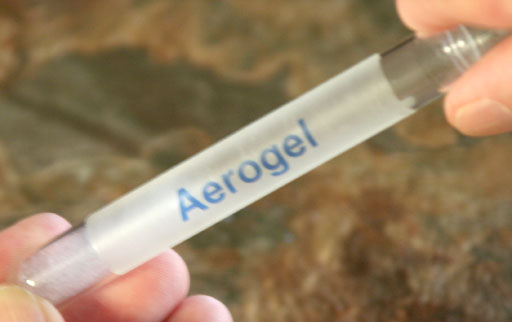Aerogel
Aerogel is a synthetic porous ultralight material derived from a gel, in which the liquid component of the gel has been replaced with a gas. The result is a solid with extremely low density and thermal conductivity. Nicknames include "frozen smoke","solid smoke", "solid air" or "blue smoke" owing to its translucent nature and the way light scatters in the material; however, it feels like expanded polystyrene (styrofoam) to the touch.
Aerogel was first created by Samuel Stephens Kistler in 1931, as a result of a bet with Charles Learned over who could replace the liquid in "jellies" with gas without causing shrinkage. Aerogels are produced by extracting the liquid component of a gel through supercritical drying. This allows the liquid to be slowly dried off without causing the solid matrix in the gel to collapse from capillary action, as would happen with conventional evaporation. The first aerogels were produced from silica gels. Kistler's later work involved aerogels based on alumina, chromia and tin dioxide. Carbon aerogels were first developed in the late 1980s.
Aerogel is a synthetic porous ultralight material derived from a gel, in which the liquid component of the gel has been replaced with a gas. The result is a solid with extremely low density and thermal conductivity. Nicknames include "frozen smoke","solid smoke", "solid air" or "blue smoke" owing to its translucent nature and the way light scatters in the material; however, it feels like expanded polystyrene (styrofoam) to the touch.
Aerogel was first created by Samuel Stephens Kistler in 1931, as a result of a bet with Charles Learned over who could replace the liquid in "jellies" with gas without causing shrinkage. Aerogels are produced by extracting the liquid component of a gel through supercritical drying. This allows the liquid to be slowly dried off without causing the solid matrix in the gel to collapse from capillary action, as would happen with conventional evaporation. The first aerogels were produced from silica gels. Kistler's later work involved aerogels based on alumina, chromia and tin dioxide. Carbon aerogels were first developed in the late 1980s.
 |
| Its Is Damn Coolest Tech Ever |
 |
| light material ever |
 |
| Ultimate New Tech |
 |
| Lets Fly to the Next Generation World |
 |
| Ultimate New Tech |
 |
| Our People Are Rocking |
 |
| The Lightest Solid Liquid |
 |
| Our People Are Rocking |
 |
| Pls Tell Something Abt This |
 |
| Aerogel The World's Lightest Solid |
 |
| Aerogel Amazing Technology |
0 comments:
Post a Comment